英文句型的转换
英语基础作文句型转换例句
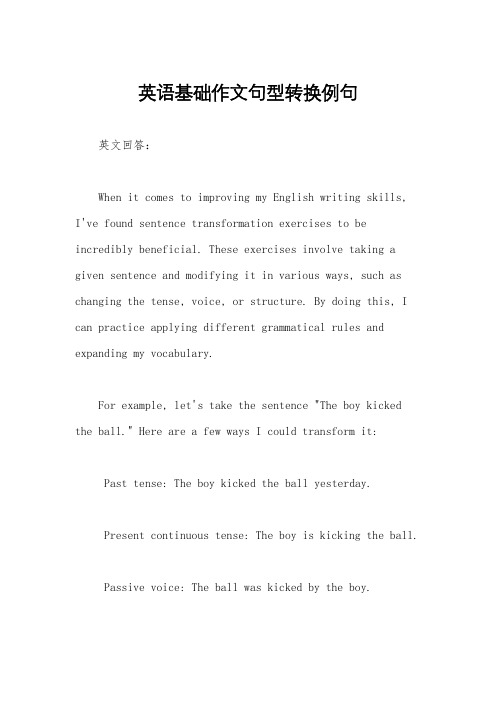
英语基础作文句型转换例句英文回答:When it comes to improving my English writing skills,I've found sentence transformation exercises to be incredibly beneficial. These exercises involve taking a given sentence and modifying it in various ways, such as changing the tense, voice, or structure. By doing this, I can practice applying different grammatical rules and expanding my vocabulary.For example, let's take the sentence "The boy kicked the ball." Here are a few ways I could transform it:Past tense: The boy kicked the ball yesterday.Present continuous tense: The boy is kicking the ball.Passive voice: The ball was kicked by the boy.Complex sentence: The boy kicked the ball because he wanted to score a goal.Conditional sentence: If the boy kicks the ball, hewill score a goal.As you can see, each transformation results in aslightly different meaning or emphasis. By practicing these exercises, I can improve my ability to convey my ideas clearly and effectively in written English.中文回答:英语基础作文句型转换例句:英语写作水平的提高,离不开句子转换练习。
电大14春英语句型转换与翻译 (1)
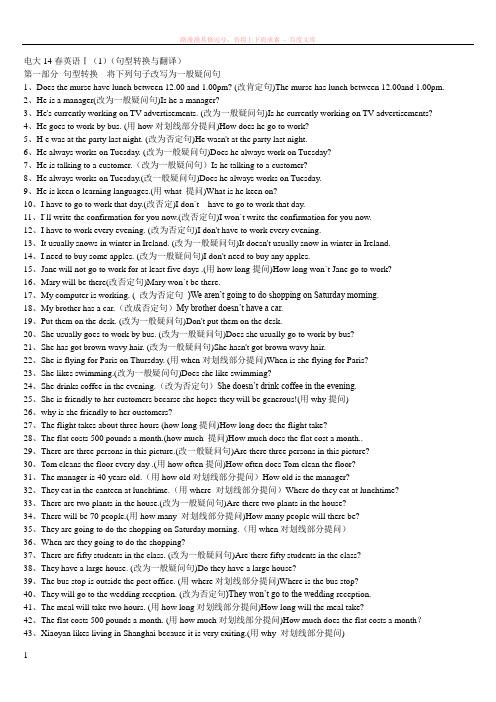
电大14春英语Ⅰ(1)(句型转换与翻译)第一部分句型转换将下列句子改写为一般疑问句1、Does the murse have lunch between 12.00 and 1.00pm? (改肯定句)The murse has lunch between 12.00and 1.00pm.2、He is a manager(改为一般疑问句)Is he a manager?3、He's currently working on TV advertisements. (改为一般疑问句)Is he currently working on TV advertisements?4、He goes to work by bus. (用how对划线部分提问)How does he go to work?5、H e was at the party last night. (改为否定句)He wasn't at the party last night.6、He always works on Tuesday. (改为一般疑问句)Does he always work on Tuesday?7、He is talking to a customer.(改为一般疑问句)Is he talking to a customer?8、He always works on Tuesday.(改一般疑问句)Does he always works on Tuesday.9、He is keen o learning languages.(用what 提问)What is he keen on?10、I have to go to work that day.(改否定)I don`t have to go to work that day.11、I`ll write the confirmation for you now.(改否定句)I won`t write the confirmation for you now.12、I have to work every evening. (改为否定句)I don't have to work every evening.13、It usually snows in winter in Ireland. (改为一般疑问句)It doesn't usually snow in winter in Ireland.14、I need to buy some apples. (改为一般疑问句)I don't need to buy any apples.15、Jane will not go to work for at least five days .(用how long提问)How long won`t Jane go to work?16、Mary will be there(改否定句)Mary won`t be there.17、My computer is working. ( 改为否定句)We aren’t going to do shopping on Saturday morning.18、My brother has a car.(改成否定句)My brother doesn’t have a car.19、Put them on the desk. (改为一般疑问句)Don't put them on the desk.20、She usually goes to work by bus. (改为一般疑问句)Does she usually go to work by bus?21、She has got brown wavy hair. (改为一般疑问句)She hasn't got brown wavy hair.22、She is flying for Paris on Thursday. (用when对划线部分提问)When is she flying for Paris?23、She likes swimming.(改为一般疑问句)Does she like swimming?24、She drinks coffee in the evening.(改为否定句)She doesn’t drink coffee in the evening.25、She is friendly to her customers becarse she hopes they will be generous!(用why提问)26、why is she friendly to her oustomers?27、The flight takes about three hours (how long提问)How long does the flight take?28、The flat costs 500 pounds a month.(how much 提问)How much does the flat cost a month..29、There are three persons in this picture.(改一般疑问句)Are there three persons in this picture?30、Tom cleans the floor every day .(用how often提问)How often does Tom clean the floor?31、The manager is 40 years old.(用how old对划线部分提问)How old is the manager?32、They eat in the canteen at lunchtime.(用where 对划线部分提问)Where do they eat at lunchtime?33、There are two plants in the house.(改为一般疑问句)Are there two plants in the house?34、There will be 70 people.(用how many 对划线部分提问)How many people will there be?35、They are going to do the shopping on Saturday morning.(用when对划线部分提问)36、When are they going to do the shopping?37、There are fifty students in the class. (改为一般疑问句)Are there fifty students in the class?38、They have a large house. (改为一般疑问句)Do they have a large house?39、The bus stop is outside the post office. (用where对划线部分提问)Where is the bus stop?40、They will go to the wedding reception. (改为否定句)They won’t go to the wedd ing reception.41、The meal will take two hours. (用how long对划线部分提问)How long will the meal take?42、The flat costs 500 pounds a month. (用how much对划线部分提问)How much does the flat costs a month?43、Xiaoyan likes living in Shanghai because it is very exiting.(用why 对划线部分提问)44、Why does Xiaoyan like living in Shanghai?45、You can smoke in the bedrooms. (改为一般疑问句)You can’t smoke in the bedroom.46、You can`t smoke here.(改祈使句)(Please)Do not smoke here.47、You can use the phone in the living room .(改否定句)You can`t use the phone in the living room .48、You get off in front of the swimming pool.(用where提问)where do you get off?第二部分翻译1、Could you open that bottle, please?请你打开那个瓶子好吗?2、David usually has a sandwich in his office at lunchtime.通常大卫的午餐是在办公室吃个三明治。
英文疑问句的句型转换方法

英文疑问句的句型转换方法1. Yes/No疑问句:
句型:陈述句+ 助动词+ 主语
转换方法:将助动词移至句首并添加疑问词
例子:
Statement: She is eating dinner.
Question: Is she eating dinner?
改为带疑问词的句子:What is she doing now?
2. WH疑问句:
句型:疑问词+ 助动词+ 主语+ 谓语
转换方法:交换主语和助动词的位置
例子:
Question: Who is driving the car?
改为陈述句:He is driving the car.
3. 选择疑问句:
句型:疑问词+ 助动词+ 主语+ 谓语+ 或者+ 谓语
转换方法:将其中一个选项变成一个陈述句
例子:
Question: Do you want pizza or sushi?
改为陈述句:I want pizza. 或者I want sushi.
4. 否定疑问句:
句型:陈述句+ 助动词+ not + 主语
转换方法:将助动词移至句首并添加疑问词以及否定词
例子:
Statement: She did not finish her homework. Question: Did she not finish her homework?
改为带疑问词的句子:Why did she not finish her homework?。
四年级英语上册句型转换通用人教PEP版
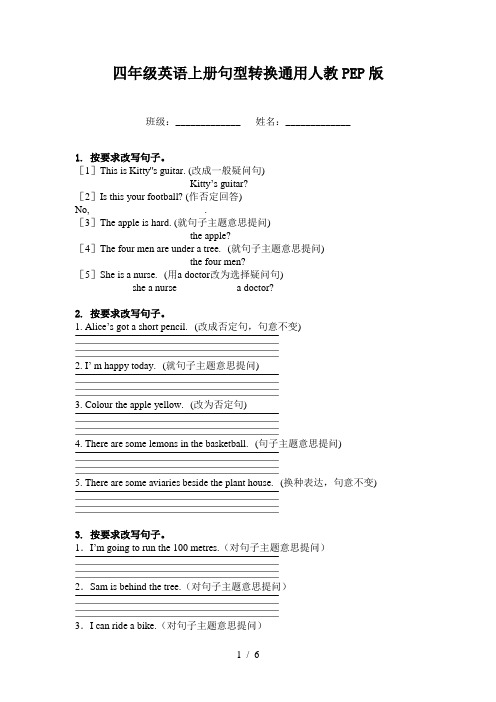
四年级英语上册句型转换通用人教PEP版班级:_____________ 姓名:_____________1. 按要求改写句子。
[1]This is Kitty''s guitar. (改成一般疑问句)___________ ___________ Kitty’s guitar?[2]Is this your football? (作否定回答)No, ___________ ___________.[3]The apple is hard. (就句子主题意思提问)___________ ___________ the apple?[4]The four men are under a tree. (就句子主题意思提问)___________ ___________ the four men?[5]She is a nurse. (用a doctor改为选择疑问句)___________ she a nurse ___________ a doctor?2. 按要求改写句子。
1. Alice’s got a short pencil. (改成否定句,句意不变)2. I’ m happy today. (就句子主题意思提问)3. Colour the apple yellow. (改为否定句)4. There are some lemons in the basketball. (句子主题意思提问)5. There are some aviaries beside the plant house. (换种表达,句意不变)3. 按要求改写句子。
1.I’m going to run the 100 metres.(对句子主题意思提问)2.Sam is behind the tree.(对句子主题意思提问)3.I can ride a bike.(对句子主题意思提问)4.They are playing chess.(改为一般疑问句)5.I can jump high.(改为一般疑问句)4. 按要求改写句子。
五年级英语外研版上学期句型转换完整版

五年级英语外研版上学期句型转换完整版班级:_____________ 姓名:_____________1. 句型转换。
[1]I want to eat some mooncakes.(根据句子主题意思提问)[2]This is Peter and Tony''s bedroom. (根据句子主题意思提问)[3]Peter''s grandfather lives in Beijing. (根据句子主题意思提问)[4]We sometimes do the housework for the old people. (改为一般疑问句)[5]My aunt''s birthday is on the first of August. (改为—般疑问句并肯定回答)2. 按要求完成各题。
1. I go to school at seven twenty.(对句子主题部分提问)_______do you go to school?2. 我不会洗衣服,但我愿意试一试(汉译英)I __________wash the clothes, but let me __________!3. Can you water the flowers, li Shan?_______, I________. (做肯定回答)_______, I ________.(做否定回答)4. Chocolate is my favorite food.(对句子主题部分提问)_______ is _______ favorite food?5. My favorite food is dumplings.(写同义句)3. 根据提示完成句子。
1.She''ll make a plan.(改为一般疑问句)2.They like apples.(就句子主题部分提问)3.We bought twelve eggs.(改为一般疑问句)4. 按要求回答问题。
专题05句型转换-2023-2024学年五年级英语下学期期末备考真题分类汇编(江苏专版)
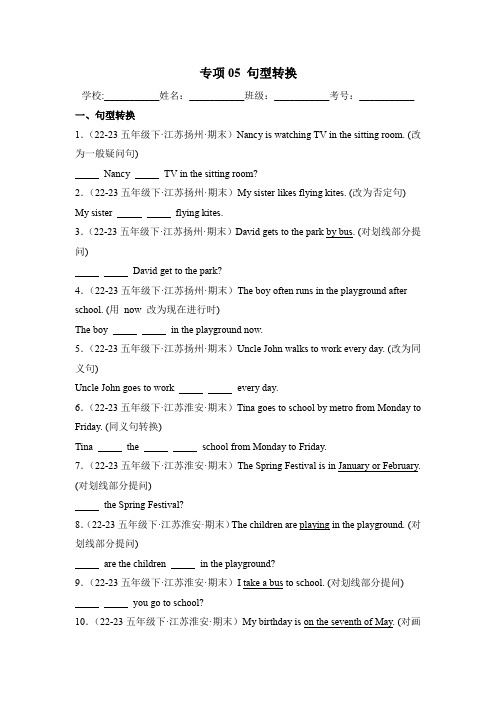
专项05 句型转换学校:___________姓名:___________班级:___________考号:___________一、句型转换1.(22-23五年级下·江苏扬州·期末)Nancy is watching TV in the sitting room. (改为一般疑问句)Nancy TV in the sitting room?2.(22-23五年级下·江苏扬州·期末)My sister likes flying kites. (改为否定句)My sister flying kites.3.(22-23五年级下·江苏扬州·期末)David gets to the park by bus. (对划线部分提问)David get to the park?4.(22-23五年级下·江苏扬州·期末)The boy often runs in the playground after school. (用now 改为现在进行时)The boy in the playground now.5.(22-23五年级下·江苏扬州·期末)Uncle John walks to work every day. (改为同义句)Uncle John goes to work every day.6.(22-23五年级下·江苏淮安·期末)Tina goes to school by metro from Monday to Friday. (同义句转换)Tina the school from Monday to Friday.7.(22-23五年级下·江苏淮安·期末)The Spring Festival is in January or February. (对划线部分提问)the Spring Festival?8.(22-23五年级下·江苏淮安·期末)The children are playing in the playground. (对划线部分提问)are the children in the playground?9.(22-23五年级下·江苏淮安·期末)I take a bus to school. (对划线部分提问) you go to school?10.(22-23五年级下·江苏淮安·期末)My birthday is on the seventh of May. (对画线部分提问)birthday?11.(22-23五年级下·江苏淮安·期末)That smells nice. (改为否定句)That nice.12.(22-23五年级下·江苏淮安·期末)I make the bed every day. (改为现在进行时) I the now.13.(22-23五年级下·江苏淮安·期末)She asks a policeman for help. (改为一般疑问句)she a policeman for help?14.(22-23五年级下·江苏·单元测试)Bobby thinks he can ride a bike to school. (改为否定句)Bobby he ride a bike to school.15.(22-23五年级下·江苏盐城·期末)He usually goes to the farm on Sundays. (改为一般疑问句)he usually to the farm on Sundays?16.(22-23五年级下·江苏淮安·期末)Tom goes swimming on Sundays. (将on Sundays改为now)Tom swimming now.17.(22-23五年级下·江苏·期末)We go to school by bus. (改为同义句)We a bus school.18.(22-23五年级下·江苏淮安·期末)She tries on the new clothes. (改为一般疑问句)she on the new clothes?19.(22-23五年级下·江苏宿迁·期末)There is a party at the prince's house. (改为否定句)There party at the prince’s house.20.(22-23五年级下·江苏宿迁·期末)She puts on the new shoes. (改为一般疑问句) she the new shoes?21.(22-23五年级下·江苏宿迁·期末)I’m so sad because I can't go to the party. (对画线部分提问)so sad?22.(22-23五年级下·江苏扬州·期末)My house is far from school. (改为否定句) My house far from school.23.(22-23五年级下·江苏扬州·期末)Tim does his homework at home. (改为否定句)Tim his homework at home.24.(22-23五年级下·江苏扬州·期末)Su Hai goes to school by taxi. (对划线部分提问)she to school?25.(22-23五年级下·江苏扬州·期末)She lives in a small town near Beijing. (对划线部分提问)she near Beijing?26.(22-23五年级下·江苏扬州·期末)My aunt works on a bus. (改成否定句)My aunt on a bus.27.(22-23五年级下·江苏扬州·期末)You should brush your teeth before bedtime. (改为否定句)28.(22-23五年级下·江苏苏州·期末)Liu Tao waits for the bus at the bus stop. (改为一般疑问句)Liu Tao for the bus at the bus stop?29.(22-23五年级下·江苏苏州·期末)It is a festival for old people. (改为一般疑问句)a festival for old people?30.(22-23五年级下·江苏苏州·期末)My aunt likes making food for the children.(改为一般疑问句)aunt food for the children?31.(22-23五年级下·江苏苏州·期末)She does her homework before dinner.(改为否定句)She her homework before dinner.32.(22-23五年级下·江苏南通·期末)My father is busy.(对画线部分提问)busy?33.(22-23五年级下·江苏南通·期末)Tom is cleaning the table.(对画线部分提问)Tom doing?34.(22-23五年级下·江苏连云港·期末)My sister listens to music every day.(用now替换every day)My sister to music now.35.(22-23五年级下·江苏南京·期末)Liu Tao and Wang Bing are watching TV too. (改为否定句)Liu Tao and Wang Bing watching TV .36.(22-23五年级下·江苏盐城·期末)Jim is catching a pest in the tree.(改一般现在时)Jim usually in the tree.37.(22-23五年级下·江苏镇江·期末)Does she walk along this road? (改为陈述句) She along the road.38.(22-23五年级下·江苏南京·期末)My grandma lives near the park. (改为一般疑问句)grandma near the park?39.(22-23五年级下·江苏镇江·期末)Which season do you like best? (根据实际情况回答问题)40.(22-23五年级下·江苏盐城·期末)Old people like eating rice cakes. (划线部分提问)do old people like ?41.(22-23五年级下·江苏盐城·期末)Teachers’ Day is in September. (划线部分提问)Teachers’ Day?42.(22-23五年级下·江苏盐城·期末)I like Spring Festival. (改为一般疑问句) you Spring Festival?43.(22-23五年级下·江苏扬州·期末)You can take a taxi to the supermarket. (改为同义句)You can go to the supermarket .44.(22-23五年级下·江苏·期末)Mr White feels tired in the hospital. (对划线部分提问)does Mr White in the hospital?45.(22-23五年级下·江苏扬州·期末)Nancy is cleaning the dishes. (对划线部分提问)is Nancy ?46.(22-23五年级下·江苏扬州·期末)Su Hai brushes her teeth every day. (改成般疑问句)Su Hai her teeth every day?47.(22-23五年级下·江苏镇江·期末)My friend has a cold. (对划线部分提问) with your friend?48.(22-23五年级下·江苏镇江·期末)He eats an apple every day. (用now替换every day)He an apple now.49.(22-23五年级下·江苏镇江·期末)The meat with potatoes smells nice(改为一般疑问句)the meat with potatoes nice?50.(22-23五年级下·江苏泰州·期末)I want to make the bed. (改为同义句)I’d to make the bed.51.(22-23五年级下·江苏镇江·期末)He can have a rest at home. (改为一般疑问句,并做否定回答)— he have a rest at home?—No, he .52.(22-23五年级下·江苏泰州·期末)Is there a potato in the fridge? (改为复数形式)Are there any in the fridge?53.(22-23五年级下·江苏泰州·期末)The meat is nice. (对划线部分提问) the meat?54.(22-23五年级下·江苏苏州·期末)— ? (根据英文提示完成句子)—To get to the cinema, you can go along Shanghai Street and then turn left at the second traffic lights. The cinema is on your left.55.(22-23五年级下·江苏泰州·期末)We often play basketball after school. (改为现在进行时)We basketball now.56.(22-23五年级下·江苏泰州·期末)They are washing some apples. (改为单数) She washing apple.57.(22-23五年级下·江苏泰州·期末)Yang Ling always plays with Kitty after school. (对划线部分提问)What Yang Ling always after school?58.(22-23五年级下·江苏泰州·期末)Cinderella has no nice clothes or shoes. (改为同义句)Cinderella doesn’t nice clothes or shoes.59.(22-23五年级下·江苏泰州·期末)I’d like some juice. (改为一般疑问句) you like juice?60.(22-23五年级下·江苏南通·期末)Mr Green goes to the supermarket by car. (改为同义句)Mr Green the car the supermarket.参考答案:1.Is watching【详解】原句句意:南希正在客厅里看电视。
句型转换和特殊疑问句的语法

句型转换和特殊疑问句的语法肯定句、否定句、一般疑问句的相互转换一、含有的be动词、助动词和情态动词的句子;一律在be动词、助动词和情态动词后加“not”,改为一般疑问句时,一律将be动词、助动词和情态动前移到句首(首字母大写)。
肯定回答用“Yes”;否定回答用“No”。
“Yes”或“No”后面的主语必须用代词,“No”后面必须用否定缩略式。
1. There are some computers in this school. (be动词)There aren’t any computers in this school.Are there any computers in this school? (Y es, there are. / No, there aren't.)2. Li Ming’s father can drive the car. (情态动词)Li Ming’s father can’t drive the car.Can Li Ming’s father drive the car? (Yes, he can. / No, he can’t.)3. She has already finished his homework now. (助动词)She hasn’t finished his homework yet.Has she finished his homework yet? (Y es, she has. / No, she hasn’t.)二、只有行为动词的句子。
必须借助助动词do; does; did。
改为否定句,在行为动词前加don’t(一般现在时态,主语是除第三人称单数之外的人称和数时);doesn’t(一般现在时态,主语是第三人称单数时);didn’t(一般过去时态)。
改为一般疑问句时,在句首加Do;Does 或Did。
肯定回答用“Yes”,后面动词用 do; does或did”;否定回答用“No”,后面动词用don’t (doesn’t; didn’t)”。
英文陈述句修改为疑问句
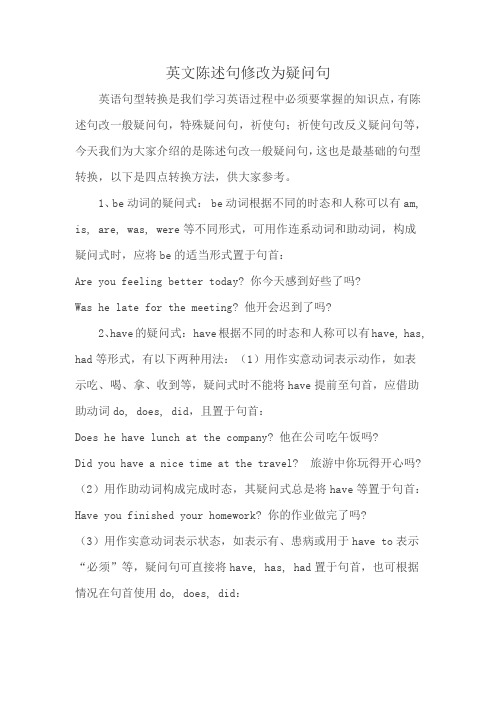
英文陈述句修改为疑问句英语句型转换是我们学习英语过程中必须要掌握的知识点,有陈述句改一般疑问句,特殊疑问句,祈使句;祈使句改反义疑问句等,今天我们为大家介绍的是陈述句改一般疑问句,这也是最基础的句型转换,以下是四点转换方法,供大家参考。
1、be动词的疑问式: be动词根据不同的时态和人称可以有am, is, are, was, were等不同形式,可用作连系动词和助动词,构成疑问式时,应将be的适当形式置于句首:Are you feeling better today? 你今天感到好些了吗?Was he late for the meeting? 他开会迟到了吗?2、have的疑问式: have根据不同的时态和人称可以有have, has, had等形式,有以下两种用法:(1)用作实意动词表示动作,如表示吃、喝、拿、收到等,疑问式时不能将have提前至句首,应借助助动词do, does, did,且置于句首:Does he have lunch at the company? 他在公司吃午饭吗?Did you have a nice time at the travel? 旅游中你玩得开心吗? (2)用作助动词构成完成时态,其疑问式总是将have等置于句首:Have you finished your homework? 你的作业做完了吗?(3)用作实意动词表示状态,如表示有、患病或用于have to表示“必须”等,疑问句可直接将have, has, had置于句首,也可根据情况在句首使用do, does, did:Have you to finish the work so late? 你必须这么晚下班吗? Does he have anything to do? 他有什么要做的吗?3、实意动词的疑问式:一般实意动词的疑问式,通常根据不同人称和时态在句首加助动词do的适当形式,如:Do you watch TV every evening? 你每天晚上都看电视吗?Did you take part in the party last night? 你昨晚参加聚会了吗?4、情态动词的疑问式:情态动词的疑问式通常是将情态动词置于句首:Must I meet you at once? 我必须马上见你吗?Can you cook? 你会做饭吗?。
初一英语句型转换试题答案及解析

初一英语句型转换试题答案及解析1.【1】Andy is American. (同义句)Andy ______ _______America.【答案】comes from【解析】句意为:安迪是美国人。
联系转换后的句子可知,其同义于“安迪来自美国”。
由于主语是第三人称单数故可填:comes from或is from。
【2】He is in Huang he Football Team.(同义句)He is_______ _______ _______ Huang he Football Team.【答案】a member of【解析】句意为:他在黄河足球队。
联系转换后的句子可知,其同义于“他是黄河足球队的一个成员”。
“---的一个成员”在英语中应表达为:a member of。
【考点】句式变换。
2.【1】My father and mother are teachers.(改为同义句) My teachers.【答案】parents, are【解析】句意:我的爸爸、妈妈是老师。
这个题目要求我们改为同义句,原句中是用的fatherand mother,爸爸、妈妈,我们可以用一个单词parents来表示相同的意思,即父母,并且因为主语是复数的,所以用are。
【2】The CDs are on the desk. (对划线部分提问) the CDs?【答案】where are【解析】句意:这些光盘在桌子上。
这个题目要求我们对划线的部分进行提问,on the desk的意思是在桌子上,因此我们应该问在哪里,疑问词是where,然后把句中的are提前,变成疑问句。
【3】This is my book.(改为同义句) This book .【答案】is mine【解析】句意:这是我的书。
这个题目要求我们变为同义句,根据句意可知,这是我的书,即这本书是我的。
mine是一个名词性的物主代词,在句中做表语,即my book。
小学英语所有句型转换的方法
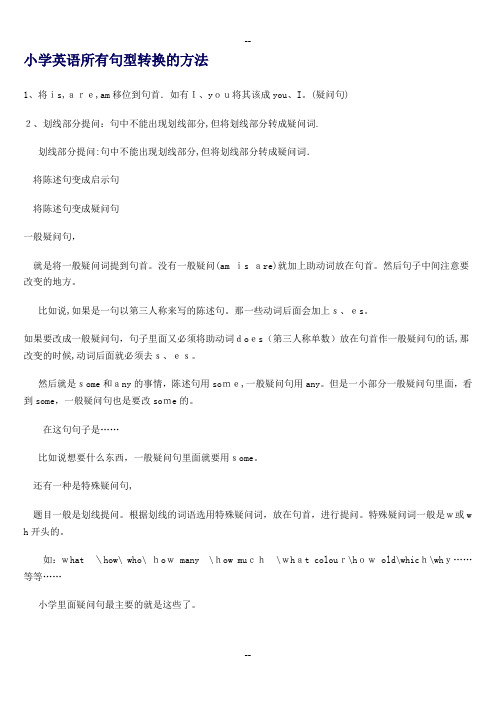
小学英语所有句型转换的方法1、将is,are,am移位到句首.如有I、you将其该成you、I。
(疑问句)2、划线部分提问:句中不能出现划线部分,但将划线部分转成疑问词.划线部分提问:句中不能出现划线部分,但将划线部分转成疑问词.将陈述句变成启示句将陈述句变成疑问句一般疑问句,就是将一般疑问词提到句首。
没有一般疑问(am is are)就加上助动词放在句首。
然后句子中间注意要改变的地方。
比如说,如果是一句以第三人称来写的陈述句。
那一些动词后面会加上s、es。
如果要改成一般疑问句,句子里面又必须将助动词does(第三人称单数)放在句首作一般疑问句的话,那改变的时候,动词后面就必须去s、es。
然后就是some和any的事情,陈述句用some,一般疑问句用any。
但是一小部分一般疑问句里面,看到some,一般疑问句也是要改some的。
在这句句子是……比如说想要什么东西,一般疑问句里面就要用some。
还有一种是特殊疑问句,题目一般是划线提问。
根据划线的词语选用特殊疑问词,放在句首,进行提问。
特殊疑问词一般是w或w h开头的。
如:what \how\ who\ how many \how much\what colour\how old\which\why……等等……小学里面疑问句最主要的就是这些了。
古人云“授人鱼,不如授人渔。
”古人尚且知道授人知识不如授人方法的道理,那么在各种理论高度发展的今天为什么就不能多重视一点方法和传授呢?句子教学是英语教学中的重要环节,有了句子作为基础,学生才能学好英语,也才能真正运用英语。
在几年的英语教学中,我总结了一些英语句子教学的小窍门,现简单归纳如下:一、肯定句改否定句的方法——一步法1、在be动词后加not。
如:is not , are not, am not, was not,were not;2、在can,should, will等后加not。
如:cannot, should not,will not;3、上述都没有的,在动词前加助动词否定形式don’t/doesn’t/didn’t。
2024年六年级上册英语句型转换真题

2024年六年级上册英语句型转换真题班级:_____________ 姓名:_____________【句型转换】1. 句型转换。
[1]What does she do at weekends?(用sometimes / have dancing lessons)She ________ ________ dancing lessons.[2]I have to get to school before 10 o’clock.(对句子主题意思提问)________ do you ________ to get to school?[3]We sometimes do the housework for the old people.(改为—般疑问句)[4]Is it grape juice?(否定回答)[5]We went there by plane.(就主题意思提问)2. 按要求改写句子。
1. My holiday was great fun. (对句子主题意思提问)______ _______ your holiday?2. It was time for lunch. (改同义句)It was time ______ _______ lunch.3. I went to the Bund for the holiday. (对句子主题意思提问)______ _______ you go for the holiday?4. I was on the farm two years ago. (改一般疑问句)______ _______ on the farm two years ago?5. His mother made a cake yesterday. (改否定句)His mother ______ _______a cake yesterday.3. 按要求完成下列句子。
1. I do my homework every day. (改为一般疑问句,并作否定回答)—________ ________ ________ your homework every day?—________, ________ ________.2. She is always a good student. (改为一般疑问句,并作否定回答)—________ ________ always a good student?—________, ________ ________.4. 按要求改写句子。
四年级英语人教新起点上册句型转换完美

四年级英语人教新起点上册句型转换完美班级:_____________ 姓名:_____________1. 句型转换。
[1]You can climb the tree. (改为否定句)You ________ ________ the tree.[2]The cows eat grass. (根据句子主题意思提问)________ ________ the cows eat?[3]This is a rabbit. (把this改成these,其余作相应变化)[4]The hens eat corn. (根据句子主题意思提问)________ ________ the hens eat?[5]I have an orange kite. (把I改成she,其余作相应变化)________ ________ an orange ________.2. 按要求改写句子。
[1]I am a student. (改成否定句)[2]I have a robot. (改成否定句)[3]Eat in the library. (改成否定句)[4]Those women have some bikes.(改成一般疑问句,并作肯定回答) [5]Those women would like some bikes.(改成一般疑问句,并作肯定回答)3. 把下列句子变成一般疑问句并做肯定回答。
[1]Peter is in the living room.[2]The box is on the table.[3]Their flat is in front of our flat.[4]She is under the table.[5]They are in the kitchen.4. 按要求改写句子。
[1]This is his nose. It''s big. (合为一句)[2]He is a king now. (改为否定句)[3]Her nose is big .(用His eyes替换相应部分,注意其它部分变化)[4]His hair is long. (改为反义句)His hair is____________[5]small, eyes, nose, and ,his, are(.)(连词成句)5. 句型转换。
英语句型转换口诀
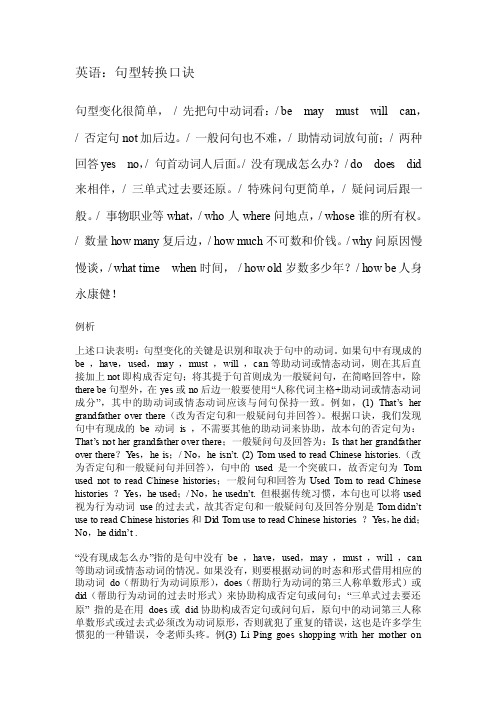
英语:句型转换口诀句型变化很简单,/ 先把句中动词看:/ be may must will can,/ 否定句not加后边。
/ 一般问句也不难,/ 助情动词放句前;/ 两种回答yes no,/ 句首动词人后面。
/ 没有现成怎么办?/ do does did 来相伴,/ 三单式过去要还原。
/ 特殊问句更简单,/ 疑问词后跟一般。
/ 事物职业等what,/ who人where问地点,/ whose谁的所有权。
/ 数量how many复后边,/ how much不可数和价钱。
/ why问原因慢慢谈,/ what time when时间,/ how old岁数多少年?/ how be人身永康健!例析上述口诀表明:句型变化的关键是识别和取决于句中的动词。
如果句中有现成的be ,have,used,may ,must ,will ,can等助动词或情态动词,则在其后直接加上not即构成否定句;将其提于句首则成为一般疑问句,在简略回答中,除there be句型外,在yes或no后边一般要使用“人称代词主格+助动词或情态动词成分”,其中的助动词或情态动词应该与问句保持一致。
例如,(1) Tha t’s her grandfather over there(改为否定句和一般疑问句并回答)。
根据口诀,我们发现句中有现成的be动词is ,不需要其他的助动词来协助,故本句的否定句为:That’s not her grandfather over there;一般疑问句及回答为:Is that her grandfather over there?Y es,he is;/ No,he isn’t. (2) Tom used to read Chinese histories.(改为否定句和一般疑问句并回答),句中的used是一个突破口,故否定句为Tom used not to read Chinese histories;一般问句和回答为Used Tom to read Chinese histories ?Y es,he used;/ No,he usedn’t. 但根据传统习惯,本句也可以将used 视为行为动词use的过去式,故其否定句和一般疑问句及回答分别是Tom didn’t use to read Chinese histories和Did Tom use to read Chinese histories ?Y es,he did;No,he didn’t .“没有现成怎么办”指的是句中没有be ,have,used,may ,must ,will ,can 等助动词或情态动词的情况。
五年级英语人教PEP版上册句型转换精编

五年级英语人教PEP版上册句型转换精编班级:_____________ 姓名:_____________1. 句型转换。
1. I’m in the bedroom.(对句子主题部分提问)2. I’m reading books.(变为否定句)2. 按要求改写句子。
[1]I like winter best.(对句子主题意思提问)______ season do you like best?[2]I often play basketball on Sundays.(对句子主题意思提问)______ do you often ______ on Sundays?[3]I often eat dinner at 7: 00 p.m.(对句子主题意思提问)______ do you often eat dinner?[4]—Do you like music?(作肯定回答)—Yes, ______ ______.[5]—When is Teachers’ Day?(根据实际情况回答)—It’s in ______.3. 将下列句子改成一般疑问句,并进行肯定和否定回答。
1. I like doing sports.(一般疑问句)(肯定和否定回答)2. He likes playing basketball.(一般疑问句)(肯定和否定回答)4. 句型转换。
(1)I’m going to read a story . (对句子主题部分提问)(2)Is it a storybook? (肯定回答)5. 按要求写句子。
1. I''m late for school because I get up late.(对句子主题部分提问)2. Tim wants to eat fish. (改为否定句)3. I like reading fairy tales.(对句子主题部分提问)4. What a pity! (翻译)5. We go to school every morning. (改为否定句)6. 句型转换。
中考英语句型转换30例(3)
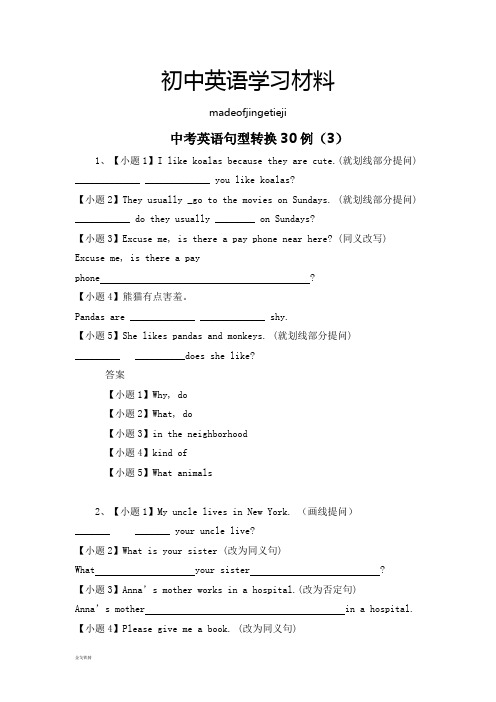
初中英语学习材料madeofjingetieji中考英语句型转换30例(3)1、【小题1】I like koalas because they are cute.(就划线部分提问) _____________ _____________ you like koalas?【小题2】They usually _go to the movies on Sundays. (就划线部分提问) ___________ do they usually ________ on Sundays?【小题3】Excuse me, is there a pay phone near here? (同义改写) Excuse me, is there a payphone ?【小题4】熊猫有点害羞。
Pandas are _____________ _____________ shy.【小题5】She likes pandas and monkeys. (就划线部分提问)_________ __________does she like?答案【小题1】Why, do【小题2】What, do【小题3】in the neighborhood【小题4】kind of【小题5】What animals2、【小题1】My uncle lives in New York. (画线提问)_______ _______ your uncle live?【小题2】What is your sister (改为同义句)What your sister ?【小题3】Anna’s mot her works in a hospital.(改为否定句)Anna’s mother in a hospital. 【小题4】Please give me a book. (改为同义句)Please a book me.【小题5】 He sleeps 8 hours every day. (改为一般疑问句)he 8 hours every day?答案【小题1】Where does【小题1】does do【小题1】doesn’t work【小题1】give to【小题1】Does sleep3、句型转换(每题2分,满分10分)1. Climb the tree. (改为否定句)2. Are these orange oranges? (改为单数句)3. The girl is a teacher. (对划线部分提问)4. We read English for half an hour every day.(对画线部分提问)5. His mother wants to buy some nice food..(对画线部分提问)答案4、按要求完成句子。
五年级人教PEP版英语上册句型转换必考题型

五年级人教PEP版英语上册句型转换必考题型班级:_____________ 姓名:_____________【句型转换】1. 句型转换。
1. I know.(变为否定句)2. I want to go to the park.(对句子主题部分提问)2. 按要求完成句子,每空一词。
[1]Mike is behind me.(改为同义句)I am________ ________ ________Mike.[2]There are twenty trees in the garden.(对句子主题意思提问)________in the garden?[3]There are some swings in the park.(改为否定句)There________ ________swings in the park.[4]There is some milk in the glass.(改为一般疑问句,并作否定回答)-________ ________ ________milk in the glass?-________, there________.[5]There is a library in our school.(对句子主题意思提问)How many________ ________ ________in your school?3. 按要求改写下列句子。
1. Jack likes the garden because it’s big and nice. (对句子主题部分提问)________ ________ Jack like the garden?2. These are Helen’s socks. (对句子主题部分提问)________ ________ are these?3. Wild geese fly north in spring. (改为一般疑问句)________ wild geese ________ north in spring?4. We read and write in the study. (对句子主题部分提问)________ do you ________ in the study?5. Mum is tidying up the dining room. (改为否定句)Mum ______ ______ up the dining room.6. It is warm in spring in the south. (对句子主题部分提问)________ ________ _________ in spring in the south?7. school, I, because, like, my, big, new, it’s, beautiful, and, (.) (连词成句)4. 按要求完成句子。
英文句型的转换

英文句型的转换1. 简单句句型的转换主语1)有时对其他句子成分无影响。
a. There is nothing inconsistent in what she said. 她的话并无前后矛盾之处。
→There is no inconsistency in what she said.b. His arrogant manner made everyone dislike him. 他的傲慢态度使大家都讨厌他。
→His arrogance made everyone dislike him.c. Your denying it is useless. 你的否认没有用。
→Your denial of it is useless.2)有时其他部分需要相应的改动。
a. Mastery of a language requires painstaking efforts. 学语言要下苦功。
→It requires painstaking efforts to master a language.b. No amount of persuasion could make her change her mind. 不管怎样劝说,她都不肯改变主意。
→Nothing could persuade her to change her mind.c. His decision was to join the army after thorough consideration. 经过深思熟虑后,他决定参军。
→He decided to join the army after thorough consideration.总结:具象和抽象主语间可互相转化。
谓语1)转化为表语a. These books can be obtained at any library. 这些书哪个图书馆都有。
→These books can be obtainable at any library.b. Every language reflects the culture that produces it. 每种语言都反映产生它→Every language is a reflection of the culture that produces it.c. She always minds her obligation to others. 她总是注意自己对别人的责任。
句子转换的方法

句子转换的方法句子转换是指将一个句子重新表达,以达到改变语气、时态、结构或句型等目的的方法。
以下是一些常见的句子转换方法。
1.改变语态:主动语态:The cat is sleeping on the mat.被动语态:The mat is being slept on by the cat.2.改变时态:一般现在时:She reads a book every night.一般过去时:She read a book every night last w eek.3.改变句型:疑问句:He knows the answer. (变为) Does he k now the answer?否定句:He is not a doctor. (变为) Isn't he a doc tor?4.使用同义词或短语:original: The child understands the concept.revised: The child grasps the idea.5.简化或复杂化句子:简化:The train arrived at the station on time.复杂化:The train, which was scheduled to arrive at the station at nine o'clock, did so punctually.6.从直接引语变为间接引语:直接引语:He said, "I will be late."间接引语:He said he would be late.7.使用被动语态:主动:She painted the wall.被动:The wall was painted by her.8.改变句子的重点:原句:The cat was chased by the dog.强调句:It was the cat that was chased by the dog.9.使用不同的连接词:原句:She is tired and she is hungry.改写:She is both tired and hungry.10.使用不同的句型结构:原句:To please everyone is a difficult task.改写:Pleasing everyone is a difficult task.句子转换是一种提高语言表达能力和丰富句式结构的技巧,它有助于增强写作和口语的灵活性。
人教PEP版四年级英语上学期句型转换专项课间习题
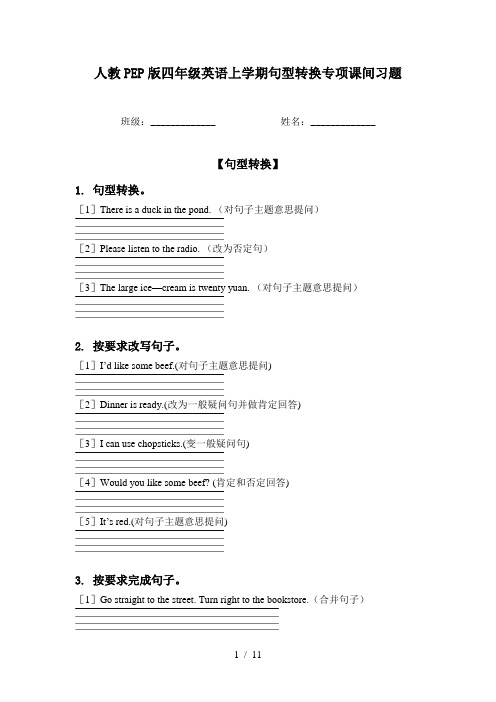
人教PEP版四年级英语上学期句型转换专项课间习题班级:_____________ 姓名:_____________【句型转换】1. 句型转换。
[1]There is a duck in the pond. (对句子主题意思提问)[2]Please listen to the radio. (改为否定句)[3]The large ice—cream is twenty yuan. (对句子主题意思提问)2. 按要求改写句子。
[1]I’d like some beef.(对句子主题意思提问)[2]Dinner is ready.(改为一般疑问句并做肯定回答)[3]I can use chopsticks.(变一般疑问句)[4]Would you like some beef? (肯定和否定回答)[5]It’s red.(对句子主题意思提问)3. 按要求完成句子。
[1]Go straight to the street. Turn right to the bookstore.(合并句子)[2]The bookstore is behind the bank.(改为一般疑问句)[3]希望你旅途愉快。
[4]tell, me, to, subway, the, way, could, you,(连词成句)[5]I want to go to the subway.(对句子主题意思提问)[6]I like reading books.(对句子主题意思提问)4. 根据题意变句型。
[1]This mouse likes to eat bread. (改复数句)____________ ______________ ____________ to eat _____________. [2]The ladybird is small. (改为否定句,但意思不变)The ladybird ___________ ____________.[3]I like nice flowers. (I改成Kitty)Kitty ___________ nice flowers.[4]My aunt is an English teacher. (对句子主题意思提问)What ___________ your aunt __________?[5]The cat is angry and tired. (对句子主题意思提问)_____________ ____________ the cat _____________?5. 按要求完成下列各题。
- 1、下载文档前请自行甄别文档内容的完整性,平台不提供额外的编辑、内容补充、找答案等附加服务。
- 2、"仅部分预览"的文档,不可在线预览部分如存在完整性等问题,可反馈申请退款(可完整预览的文档不适用该条件!)。
- 3、如文档侵犯您的权益,请联系客服反馈,我们会尽快为您处理(人工客服工作时间:9:00-18:30)。
英文句型的转换1. 简单句句型的转换1.1 主语1)有时对其他句子成分无影响。
a. There is nothing inconsistent in what she said. 她的话并无前后矛盾之处。
→There is no inconsistency in what she said.b. His arrogant manner made everyone dislike him. 他的傲慢态度使大家都讨厌他。
→His arrogance made everyone dislike him.c. Your denying it is useless. 你的否认没有用。
→Your denial of it is useless.2)有时其他部分需要相应的改动。
a. Mastery of a language requires painstaking efforts. 学语言要下苦功。
→It requires painstaking efforts to master a language.b. No amount of persuasion could make her change her mind. 不管怎样劝说,她都不肯改变主意。
→Nothing could persuade her to change her mind.c. His decision was to join the army after thorough consideration. 经过深思熟虑后,他决定参军。
→He decided to join the army after thorough consideration.总结:具象和抽象主语间可互相转化。
1.2 谓语1)转化为表语a. These books can be obtained at any library. 这些书哪个图书馆都有。
→These books can be obtainable at any library.b. Every language reflects the culture that produces it. 每种语言都反映产生它的文化。
→Every language is a reflection of the culture that produces it.c. She always minds her obligation to others. 她总是注意自己对别人的责任。
→She is always mindful of her obligation to others.2)转化为“动词+名词”a. He apologized for having broken his promise. 他为违背诺言而道歉。
→He offered apologies for having broken his promise.b. She recited a poem by Bai Juyi. 她朗诵了白居易的一首诗。
→She gave a recitation of a poem by Bai Juyi.c. He applied for a passport. 他申请了一份护照。
→He made an application for a passport.1.3 宾语1)抽象与具象名词间的互换a. The expansion of the city required extension of the communication lines. 城市要扩大就要延长交通线。
→The expansion of the city required extended communication lines.b. The report revealed the precariousness of their position. 报告透露了他们处境的危险。
→The report revealed their precarious position.c. They were deeply impressed by the fluency of her English. 她流利的英语给他们留下了深刻的印象。
→They were deeply impressed by her fluent English.2)部分宾语(宾补)发生变化a. They always consider themselves to be right. 他们总认为自己是对的。
→They always consider themselves to be in the right.b. I believe him to be honest. 我相信他是诚实的。
→I believe him honest.1.4 表语1)名词与形容词互换a. Your suggestions are of great value to us. 你的建议对我们很有价值。
→Your suggestions are very valuable to us.b. Sunlight is of great benefit to the human body. 阳光对人体很有好处。
→Sunlight is greatly beneficial to the human body.2)被动结构转化为“be+介词短语”a. The road is being repaired. 马路正在翻修。
→The road is under repair.b. The scene could not be described. 景色无法形容。
→The scene is beyond description.1.5 状语1)副词转换为“介词短语”a. She purposely ignored me at the party. 她在晚会上故意不理我。
→She ignored me on purpose at the party.b. I only met her accidentally. 我只是偶然碰到她。
→I only met her by accident.2)不定式转换为“介词短语”a. The policemen ran through the street to pursue the bank robbers. 警察在马路上追逐银行劫犯。
→The policemen ran through the street in pursuit of the bank robbers.b. We walked through the woods to search for the little girl. 我们穿过树林找寻那个小女孩。
→We walked through the woods in search of the little girl.3)分词短语转换为“介词短语”a. The staff members in the office are all busy working. 办公室的职员们都在紧张地工作。
→The staff members in the office are all busy at work.b. He entered, accompanied by a group of boys. 他和一群男孩走了进来。
→He entered in company with a group of boys.1.6 定语1)形容词转换为“介词短语”a. It is a very important discovery. 这是一项重大发现。
→It is a discovery of great importance.b. She is an intelligent girl. 她是个智力很高的姑娘。
→She is a girl of high intelligence.2)其他转换a. It is indeed a day to be remembered. 这确实是一个难忘的日子。
→It is indeed a memorable day.b. I want to book a room accessing to Internet. 我想订一间可以上网的房间。
→I want to book a room accessible to Internet.2.简单句与复合句的互换2.1 主语从句1)主语从句转换为“不定式”a. It is so regrettable that one should be so extravagant. 这样奢侈浪费是令人遗憾的。
→It is so regrettable to be so extravagant.b. It has not been decided where we should hold the conference. 在哪里开会还没有决定。
→It has not been decided where to hold the conference.2)主语从句转换为“动名词短语”a. It worries her that Tom should mix with such people. 汤姆和这样的人来往令她发愁。
→Tom’s mixing with such people worries her.b. It is a great honor that you’ve come to visit us. 你的来访是我们的一大荣幸。
→Your coming to visit us is a great honor.2.2 表语从句1)表语从句转换为“不定式”a. My idea is that we should rent an apartment. 我的想法是去租一套房子。
→My idea is to rent an apartment.b. The question is how we could raise so much money. 问题是如何筹集这么多资金。
→The question is how to raise so much money.2)表语从句转换为“动名词短语”a. Our chief worry was that she lacked enthusiasm. 我们主要担心她缺乏热情。
→Our chief worry was her lacking in enthusiasm.b. My suggestion is that we make immediate inquiries into the matter. 我建议马上调查此事。
